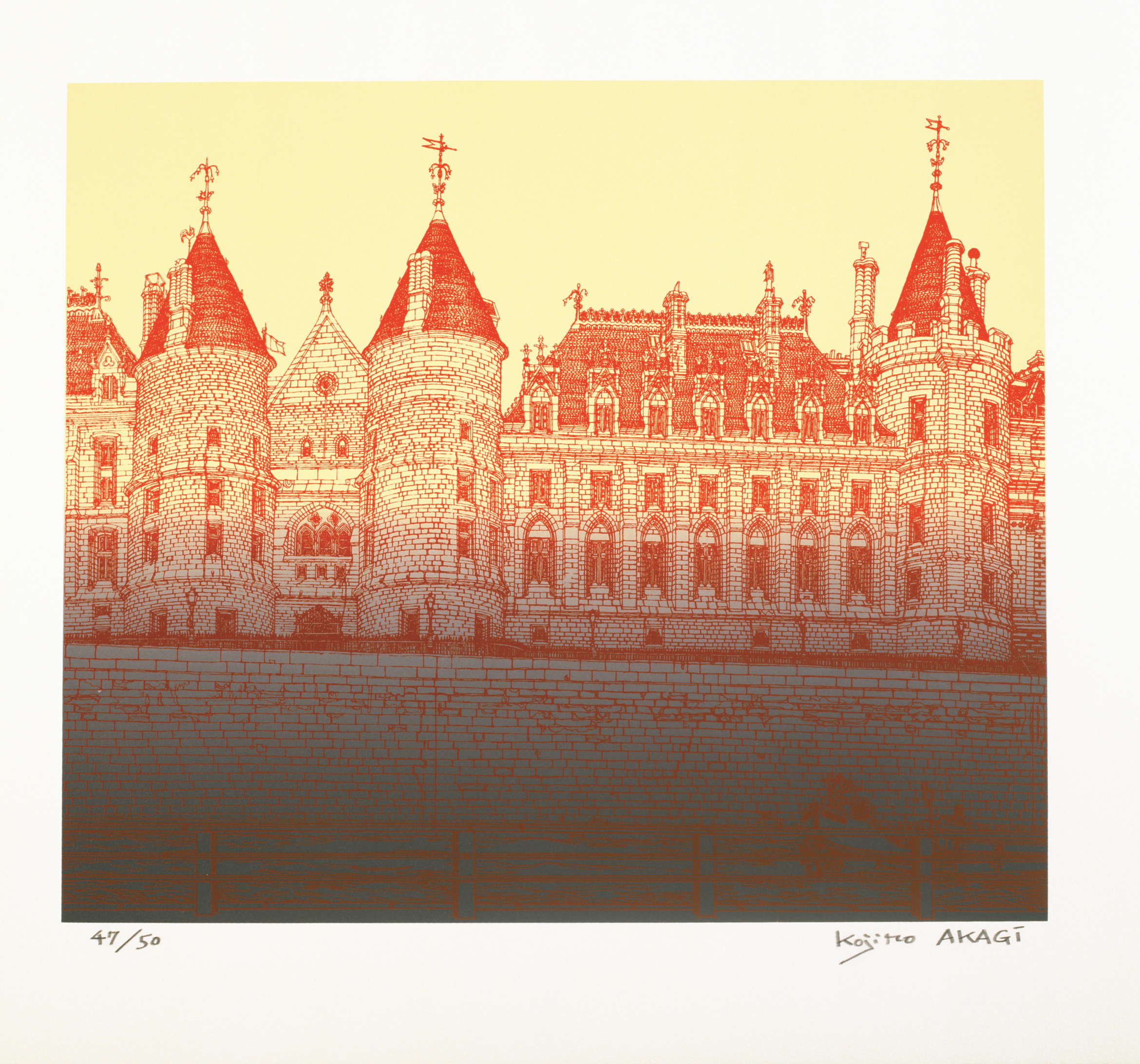La Conciergerie, Ile de la Cité / La Conciergerie and Paris Law Courts / コンシェルジェリー(シテ島)
Dublin Core
Title
La Conciergerie, Ile de la Cité / La Conciergerie and Paris Law Courts / コンシェルジェリー(シテ島)
Subject
Conciergerie, Ile de la Cité, Sérigraphie
Description
Parmi les trois tours qui jalonnent le bâtiment, on dit que la plus ancienne est celle de droite. Elle date du milieu du 13e siècle, tandis que les deux autres sont achevés vers la fin du même siècle. En ce temps-là, la rue en contrebas de l’édifice n’existait pas et le mur du château plongeait directement dans la Seine. Inutile d’aller jusqu’au bord de la Loire pour voir de vieux châteaux : Paris a gardé les traces du château qui servait de palais aux Capétiens et qui devient ensuite le centre administratif et judiciaire. Au départ du roi, le bâtiment devient une prison et est renommé la Conciergerie. C’est d’ici que démarra la voiture à cheval qui emporta Marie-Antoinette - connu chez les Japonais pour le manga Berubara (Roses de Versailles) - vers son lieu d’exécution. Aujourd’hui, le bâtiment entier forme l’enceinte du Palais de justice. On peut visiter librement certaines salles conservées en leur état depuis le 13e siècle, comme celle agrandie au 19e siècle : une sorte de voyage dans le temps, dans l’univers des lithographies de Daumier. La Conciergerie est l’une des étapes incontournables des visites touristiques et historiques de Paris.
You can see three tubular towers in this work. The far right one is the oldest, having been completed in the mid 13th century. The other two on the left side were completed in the late 13th century. Long ago there was no road along the wall but instead the river Seine splashed against the wall. There is no need to take a Chateau tour around the river Loire as there are ruins of the castle which was from Capetian dynasty (987 - 1382). A magistrate’s office and a court were built around here and the King did not want to live there so he left the castle. The castle was then used as a prison and is called “conciergerie” (a prison at the time of French Revolution). Marie Antoinette was taken to a place of execution by a horse carriage from the gate here, in a Japanese comic book called “The Rose of Versailles.”Currently the whole building is occupied by a court and you can visit many rooms freely. The oldest room was from the 13th century and there is a new building which was added in the 19th century. Paris offers great historical tours.
三つの円筒があるが、右端の塔が古くて十三世紀半ば、左側の二つ並んだ塔は十三世紀末ごろに出来たものという。昔は下の道路は無くて、壁がセーヌ河の水にヒタヒタと洗われていた。なにもロワール河のシャトー巡りに行かなくても、パリの町のど真ん中にちゃんと古い城の跡が残っていて、ここにカペ王朝(九八七年~一三二八年)の王宮の一つがあったのだ。 代官所があったり、裁判所があったり、王様が住まなくなって、ここは監獄にも使われたのでコンシェルジェリー(門衛所、フランス革命の時の牢獄)と呼ばれている。「ベルばら」のマリー・アントワネット王妃も、ここの門から馬車で処刑場に運ばれて行った。現在は建物全体が裁判所の構内で、十三世紀のままの古い部屋から、十九世紀に増築され、建てられたものまで、ドーミエの石版画裁判所光景そのままから、現役の裁判所光景まで入り混じって、自由に見学できる。パリならではの歴史観光コースである。
Creator
Kojiro Akagi (1934-2021)
Date
Juillet 1976 / July 1976
Rights
Fonds de dotation Kojiro AKAGI
Format
Sérigraphie, Atelier Del Arco,50 tirages + 14 E.A. romain, sur papier Arches 50 x 65 cm.
Type
Sérigraphie
Citation
Kojiro Akagi (1934-2021), “La Conciergerie, Ile de la Cité / La Conciergerie and Paris Law Courts / コンシェルジェリー(シテ島),” Kojiro Akagi - Fonds de dotation Kojiro AKAGI , accessed March 1, 2026, https://kojiroakagi.com/gallery/items/show/48.

